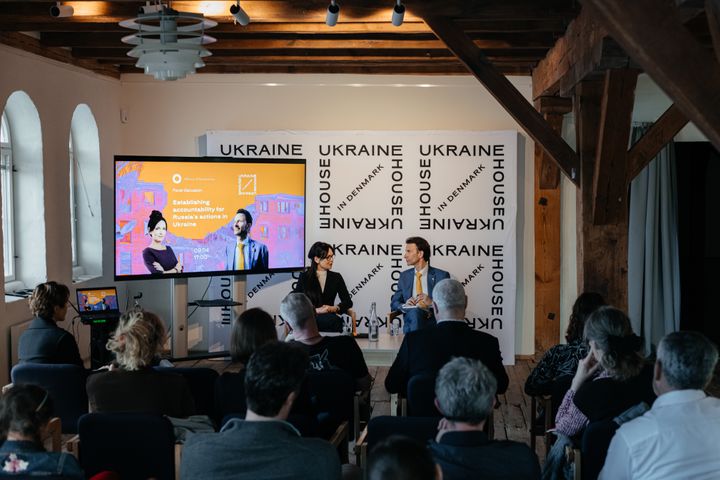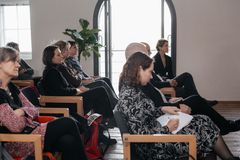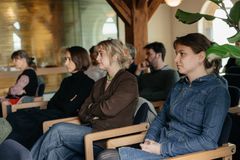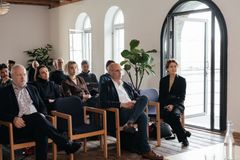Making Russia Pay – International Accountability Pathways to Justice discussed at Ukraine House Panel
As Russia’s war enters its third year, the question isn’t whether Ukraine will endure—but whether justice will. On April 9, Ukraine House in Denmark, in partnership with the Alliance of Democracies Foundation, convened a public discussion, “Establishing Accountability for Russia’s Actions in Ukraine”, with a sharp focus: how the world can make Russia pay—literally and legally—for its aggression.
Featuring Jonas Parello-Plesner, Executive Director of the Alliance of Democracies Foundation, and Julia Kyrpa, Board Member of the Register of Damage for Ukraine (RD4U), the conversation illuminated a fast-moving and historic effort: building an international compensation system without Russia’s consent.

“Justice is a prerequisite for peace.”
Opening the event, Nataliia Popovych, Chairperson of Ukraine House in Denmark, underlined Ukraine’s growing concern:
“In the current global discussions about ceasefires in the Russian-Ukrainian war, it is becoming more difficult to hear the voice of Ukraine that sees justice as a prerequisite for any lasting peace.”
Jonas Parello-Plesner reinforced the importance of keeping Ukraine front and center—not only geopolitically but culturally and morally:
“What is important about Ukraine House is that you put Ukraine on the map not just as a geopolitical object but as people—people that create, people that write, people that are artistic—it's about Ukraine that still thrives.”
“Economic deterrence”: Holding Russia financially accountable
With over $524 billion in damages since 2022—and more than $1 trillion since 2014—Ukraine’s losses mark the largest postwar devastation since WWII, Julia Kyrpa explained:
“Russia has killed more than 12,000 civilians and wounded more than 30,000. Official records show over 65,000 soldiers killed and 380,000 wounded. More than 20,000 Ukrainian children have been unlawfully deported to Russia.”
The strategy is clear: justice that punishes aggression and deters future wars.
“If Ukraine and its partners make Russia accountable and actually pay for everything they’ve destroyed, that also serves as deterrence—for them, and for any other power considering similar aggression,” noted Jonas Parello-Plesner.
A first in legal history: Justice without Russia’s consent
The Register of Damage is the first international legal mechanism to pursue reparations without an aggressor's approval. In just two years, Ukraine—backed by the UN General Assembly—has created a fully operational system:
“When we started in 2022, everyone told us this was impossible. But in just two years, we created a fully operational international mechanism,” said Julia Kyrpa.
Today, 43 countries, including Denmark, the EU, the US, Canada, and Japan, are already supporting the register. Over 25,000 claims have been filed; hundreds of thousands more are expected by the end of 2025.
Ukrainians can now file claims in 15 minutes via the DIA platform, with data securely replicated in Europe for future international proceedings:
“The evidence database is replicated in Europe and will be used for the purposes of international evidence.”
Recognition is power—even before reparations begin
Although direct reparations are still pending, the act of recognition—through the international register or Ukraine’s national “eRecovery” system—is already reshaping narratives:
“No money can bring back loved ones. But recognizing a person as a victim of Russian aggression is justice in itself.”
The Ukrainian government currently offers €30,000 in housing compensation per victim, a symbolic but necessary step until larger international reparations are unlocked.
Accountability is not just for Ukraine—it’s for the world
The discussion closed with a powerful reminder of what’s really at stake:
“Persons who lost their loved ones, people who got wounded and people who suffered mental pain and anguish because of tortures, forced labor, sexual violence, deprivation of liberty and other matters—they are victims of the aggression and they are entitled to financial compensation. However, the recognition of this fact is more important than the compensation as such because no physical compensation and monetary compensation will suffice [the pain]. The victims of Russian aggressions say that first of all they need international recognition of the violation of their rights, they need understanding that crimes which Russia created will not remain unpunished.”
What you can do:
-
Governments: Join or fund the Register of Damage for Ukraine. Recognition today builds legal precedent for tomorrow.
-
Civil society & diaspora: Help victims file claims via DIA and raise awareness of this historic legal instrument.
-
Donors & partners: Invest in justice infrastructure—legal systems, digital platforms, and advocacy that make accountability work.
-
Media & influencers: Reframe the conversation—not around ceasefire optics, but on the moral and legal terms of peace.
Justice for Ukraine is Justice for the World
This is no longer just about Ukraine. It’s about whether international law matters. Whether the aggressor pays. And whether democracies can move beyond sympathy—toward systems that deliver justice.
Ukraine House in Denmark thanks the Alliance of Democracies Foundation and all those working to ensure justice is not postponed, and accountability is not optional.
Keywords
Images
About Ukraine House
The Ukraine House in Denmark is a civil society organisation of Ukrainian cultural diplomacy based in Copenhagen. Its mission is to form an enduring positive influence of Ukraine on Ukrainian-Danish cooperation, security, and lasting peace in Europe.
Subscribe to releases from Ukraine House in Denmark
Subscribe to all the latest releases from Ukraine House in Denmark by registering your e-mail address below. You can unsubscribe at any time.
Latest releases from Ukraine House in Denmark
Udstillingen »My Body Is a Battlefield« udsat for hærværk i København23.12.2025 12:39:22 CET | Nyhed
København, 23. december 2025 – Ukraine House in Denmark (UHD) og Spilne Art fordømmer på det kraftigste hærværket mod skulpturerne fra udstillingen »My Body Is a Battlefield. Copenhagen« [Min krop er en slagmark, København] af den ukrainske kunstner Mariia Kulykivska. Udstillingen, der var organiseret af Spilne Art i samarbejde med Ukraine House i Danmark, blev udsat for hærværk i fuldt dagslys den 22. december 2025 i nærheden af UHD's lokaler.
Exhibition “My Body Is a Battlefield.” vandalised in Copenhagen23.12.2025 11:27:49 CET | Nyhed
Copenhagen, 23 December 2025 — Ukraine House in Denmark (UHD) and Spilne Art strongly condemn the vandalism of outdoor sculptures from the exhibition “My Body Is a Battlefield. Copenhagen” by Ukrainian artist Mariia Kulykivska. The exhibition, organised by Spilne Art in cooperation with Ukraine House in Denmark, was vandalised in broad daylight on 22 December 2025 near the premises of UHD.
"An open world is not a naïve world." — Nataliia Popovych at the Open World Conference 202517.12.2025 08:00:00 CET | Pressemeddelelse
In her speech during the Open World Conference 2025, organized by the University of Copenhagen to discuss the contemporary relevance of Niels Bohr's historic letter to the United Nations about the principles of openness in global science in the 1950s, Nataliia Popovych gave a sobering account about why openness towards an unreformed empire both in the 20th and, even more so, in the 21st century is dangerous.
When Deterrence Fails: Nuclear Security and the Collapse of Global Restraint in the Face of Russian Aggression on Ukraine17.12.2025 08:00:00 CET | Pressemeddelelse
On December 5, Ukraine House in Denmark, together with the Danish Foreign Policy Society, organized a panel discussion on nuclear security and its implications in the face of the Russian war against Ukraine and the free world. Leading experts examined how Ukraine’s denuclearization, Russia’s nuclear coercion, and the occupation of the Zaporizhzhia Nuclear Power Plant (ZNPP) have transformed nuclear risk from an abstract threat into a daily geopolitical reality with global consequences.
An exhibition by Mariia Kulykivska, “My Body is a Battlefield. Copenhagen”, opens in Copenhagen — a powerful artistic manifesto about the body’s memory, war, and rebirth3.12.2025 08:00:00 CET | Pressemeddelelse
On November 18, an open-air exhibition by Ukrainian artist Mariia Kulykivska — a continuation of her long-term project “My Body is a Battlefield” — opened along the Copenhagen waterfront. The event was organized by the contemporary art platform Spilne Art in cooperation with the Ukraine House in Denmark.
In our pressroom you can read all our latest releases, find our press contacts, images, documents and other relevant information about us.
Visit our pressroom



